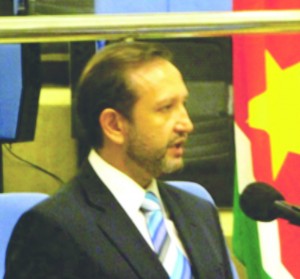
International Conference Centre
The Guyana government’s efforts at promoting the rights of the indigenous population have gained the recognition of the Amazon Cooperation
Treaty Organisation (ACTO), an international body aimed at the promotion of sustainable development of the Amazon Basin.
According to a Government Information Agency (GINA) report, ACTO Executive Director, Ambassador Mauricio Dorfler, who addressed the ACTO fifth meeting of high authorities on indigenous affairs on Monday, made reference to the granting of indigenous lands, the promotion of higher education, health, access, culture, among others.
“These are the experiences that can serve as a model not only for the indigenous people but also for the national development and identity,” Ambassador Dorfler said at the Guyana International Conference Centre (GICC).
Policy initiatives by successive People’s Progressive Party/ Civic (PPP/ C) governments have been credited to the improvements that have been evident among the Amerindian communities in the remote areas of Guyana.
Amerindian Affairs Minister Pauline Sukhai told the gathering about Guyana being among the few countries to craft legislation on indigenous rights long before the United Nations (UN) Declaration of Indigenous Peoples Rights was submitted for member countries’ approval.
The protection of indigenous people’s rights and welfare has been given primacy with the legal framework captured in the Amerindian Act of 2006, which Minister Sukhai recommended as a model for other countries to examine.
Reference was also made to major development projects targeting the country’s indigenous people based on the consent agreement and priorities of the respective villages. Among them is the granting of land titles to about 90 per cent of the eligible communities, the creation of an Amerindian Development Fund (ADF) to sustain livelihood and economic viability of villages, installation of 12,000 solar panel units to Amerindian households, the investment in modern schools and hospitals in the remote areas, and establishment of computer hubs in 150 villages to support the One Laptop Per Family (OLPF) Project.
“This initiative (OLPF) is intended to prepare indigenous people’s advancement towards a better life in this current period of advanced technological and information base,” Minister Sukhai said.
Access to education has improved significantly with the construction of schools equipped with dormitory, and the school feeding and uniform programmes.
Additionally, the Hinterland Scholarship Programme and technical vocational training have provided Amerindian students with the avenue for educational empowerment.
A week-long National Toshaos Council (NTC) meeting each year provides an opportunity for village leaders to voice concerns to the president, government ministers and other officials.
September is designated Amerindian Heritage month each year to showcase all aspects of the culture and development of the nation’s first people. This too, was hailed by Ambassador Dorfler.
The ACTO High-Level meeting coincides with the month-long activities that include an exhibition; homage to Stephen Campbell, the first Amerindian parliamentarian; visits to a designated heritage village; a pageant; and sports.



